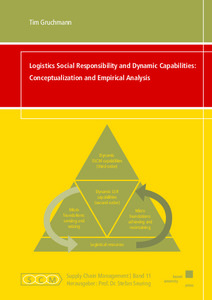Datum
2018Autor
Gruchmann, TimSchlagwort
380 Handel, Kommunikation, Verkehr LogistikunternehmenSupply Chain ManagementNachhaltigkeitCorporate Social ResponsibilityMetadata
Zur Langanzeige
Buch
 Link zu kassel university press
Link zu kassel university press

Logistics Social Responsibility and Dynamic Capabilities: Conceptualization and Empirical Analysis
Zusammenfassung
Logistics Social Responsibility (LSR) emerged as a concept to integrate sustainability throughout logistics-oriented processes in the supply chain. Hence, logistics services are linked to sustainability requirements. To meet these requirements, logistics service providers can respond to their responsibility by reducing the ecological and social impact in the supply chain. Moreover, it has been recognized that consumers also need to adapt to sustainability requirements: e.g., by supporting sustainable logistics strategies with their monetary “votes” or by changing their own consumption behavior. This “shared responsibility” requires mutual support and cooperation. Therefore, the core of this dissertation is that logistics service providers can further support sustainable development by facilitating more sustainable consumer choices.To enhance LSR activities, the link to the dynamic capabilities theory is investigated. Here, several capabilities have been identified through which managers can pool their knowledge and skills to generate new knowledge, solutions or resource configurations. Using these capabilities in a strategic manner, logistics service providers can purposefully change their business environment by forming new partnerships or changing existing relationships to gain from developing new business practices stressing sustainable purposes.
Zusätzliche Informationen
Zugleich: Dissertation, Universität Kassel, 2018Druckausgabe
Zitieren
@book{doi:10.19211/KUP9783737605755,
urn:nbn:de:0002-405759,
author={Gruchmann, Tim},
title={Logistics Social Responsibility and Dynamic Capabilities: Conceptualization and Empirical Analysis},
publisher={kassel university press},
year={2018}
}
0500 Oax
0501 Text $btxt$2rdacontent
0502 Computermedien $bc$2rdacarrier
1100 2018$n2018
1500 1/eng
2050 ##0##urn:nbn:de:0002-405759
3000 Gruchmann, Tim
4000 Logistics Social Responsibility and Dynamic Capabilities: Conceptualization and Empirical Analysis / Gruchmann, Tim
4030
4060 Online-Ressource
4085 ##0##=u http://nbn-resolving.de/urn:nbn:de:0002-405759=x R
4204 \$dBuch
4170
5550 {{Logistikunternehmen}}
5550 {{Supply Chain Management}}
5550 {{Nachhaltigkeit}}
5550 {{Corporate Social Responsibility}}
7136 ##0##urn:nbn:de:0002-405759
<resource xsi:schemaLocation="http://datacite.org/schema/kernel-2.2 http://schema.datacite.org/meta/kernel-2.2/metadata.xsd"> 2023-05-31T14:52:50Z 2023-05-31T14:52:50Z 2018 doi:10.19211/KUP9783737605755 978-3-7376-0575-5 (e-book) urn:nbn:de:0002-405759 http://hdl.handle.net/123456789/14778 Zugleich: Dissertation, Universität Kassel, 2018 eng kassel university press Urheberrechtlich geschützt https://rightsstatements.org/page/InC/1.0/ 380 Logistics Social Responsibility and Dynamic Capabilities: Conceptualization and Empirical Analysis Buch Logistics Social Responsibility (LSR) emerged as a concept to integrate sustainability throughout logistics-oriented processes in the supply chain. Hence, logistics services are linked to sustainability requirements. To meet these requirements, logistics service providers can respond to their responsibility by reducing the ecological and social impact in the supply chain. Moreover, it has been recognized that consumers also need to adapt to sustainability requirements: e.g., by supporting sustainable logistics strategies with their monetary “votes” or by changing their own consumption behavior. This “shared responsibility” requires mutual support and cooperation. Therefore, the core of this dissertation is that logistics service providers can further support sustainable development by facilitating more sustainable consumer choices.To enhance LSR activities, the link to the dynamic capabilities theory is investigated. Here, several capabilities have been identified through which managers can pool their knowledge and skills to generate new knowledge, solutions or resource configurations. Using these capabilities in a strategic manner, logistics service providers can purposefully change their business environment by forming new partnerships or changing existing relationships to gain from developing new business practices stressing sustainable purposes. open access Gruchmann, Tim 2018-09-05 xiv, 168 Seiten Kassel, Universität Kassel, Fachbereich Wirtschaftswissenschaften Seuring, Stefan (Prof. Dr.) Brandenburg, Marcus (Prof. Dr.) Hübner, Alexander (Prof. Dr.) Kassel 978-3-7376-0574-8 (print) Logistikunternehmen Supply Chain Management Nachhaltigkeit Corporate Social Responsibility publishedVersion Supply Chain Management Band 11 true 29,00 Supply Chain Management Wirtschaftswissenschaft Dissertation FB 07 / Wirtschaftswissenschaften true Softcover DIN A5 </resource>
Die folgenden Lizenzbestimmungen sind mit dieser Ressource verbunden:
Urheberrechtlich geschützt

